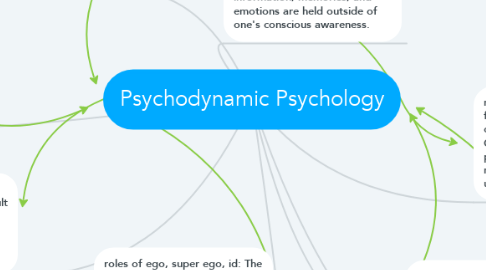Psychodynamic Psychology
by Karen Ruiz

1. principles of the theory: believe that some knowledge, information, memories, and emotions are held outside of one's conscious awareness.
2. basic assumptions: The major causes of behaviour have their origin in the unconscious. Psychic determinism: all behaviour has a cause/reason.
3. areas of application: the psychodynamic perspective continues to influence many different areas of contemporary psychology.
4. strengths: First, it accounts for the impact of childhood on adult personality and mental health. Second, it explores the innate drives that motivate our behavior.
5. roles of ego, super ego, id: The id is the impulsive (and unconscious) part of our psyche which responds directly and immediately to basic urges, needs, and desires. The ego develops to mediate between the unrealistic id and the external real world. It is the decision-making component of personality. The superego's function is to control the id's impulses, especially those which society forbids, such as sex and aggression.
6. limitations: Ignores Biological Components, Hard for Others to Accept this Belief, Insurance Does Not Cover It.
7. main features: Our behaviour and feelings as adults are rooted in our childhood experiences. Our behaviour and feelings are powerfully affected by the meaning of events to the unconscious mind.
8. unconscious mind: is a reservoir of feelings, thoughts, urges, and memories that outside of our conscious awareness.


